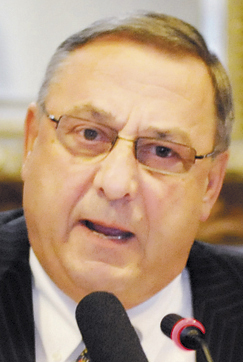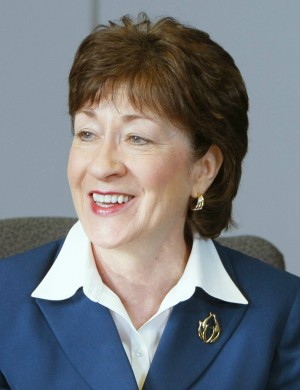AUGUSTA – Gov. Paul LePage tried to recruit U.S. Sen. Susan Collins to lobby Republican state lawmakers to oppose Medicaid expansion during the height of legislative debate on the issue, according to records obtained by the Portland Press Herald.
But Collins would not contact any of the 12 legislators identified June 4 in an email to her office because the lobbying would have been outside “the agreement,” according to an email reply to the administration from a Collins staff member.
It isn’t surprising that Collins decided not to publicly plunge into the battle over Medicaid expansion, the most hotly contested policy fight of this legislative session. The third-term U.S. senator has a long-established aversion to meddling in state-level issues. Reporters were largely unable to get her definitive positions on state referendums on same-sex marriage and gambling.
Surprising to many state lawmakers was that the governor asked Collins to get involved in the Medicaid issue.
The request, documented in a series of emails obtained by the Press Herald through a public records request, illustrates the high stakes in the expansion debate. The expansion would have extended MaineCare coverage to about 60,000 low-income residents.
In states including Arizona, Michigan and Florida, the issue has pitted Republicans against Republicans as governors and lawmakers have weighed resisting a key component of the Affordable Care Act against accepting millions of federal dollars to provide health insurance to poor residents.
In Maine, Republican supporters of Medicaid expansion were vastly outnumbered by opponents. And LePage made the proposal a priority for defeat.
Still, Democrats, who hold the majority in the Legislature, needed about a dozen Republicans to override the governor’s veto.
A list of Republicans, dubbed “soft on the issue” by House Republican leader Kenneth Fredette, began circulating in early June, just as lawmakers prepared to vote on an amended version of L.D. 1066, the expansion bill sponsored by Rep. Linda Sanborn, D-Gorham.
The amendment, crafted by Sen. Roger Katz, R-Augusta, was designed to address Republicans’ publicly stated reasons for opposing expansion. It sought a federal guarantee that Maine would receive 100 percent reimbursement for three years, an outside review of expansion’s effectiveness and cost, and an end to expansion after the full federal backing ended in 2016.
Katz’s amendment was introduced June 6, but rumor of a Republican-sponsored compromise began circulating in the State House before that. On June 4, John McGough, LePage’s chief of staff, emailed Collins’ team seeking assistance.
The email to Mary Dietrich, Collins’ chief of staff, contained a list of 12 Republican lawmakers and their phone numbers. McGough wrote that the governor and Health and Human Services Commissioner Mary Mayhew were asking Collins to contact the 12.
“Commissioner Mayhew’s office will be forwarding talking points for the Senator this afternoon,” McGough wrote.
Dietrich responded four minutes later, saying she would forward the email to Collins’ scheduler. Four minutes later, she sent a second email to McGough.
“Not sure that this is the agreement,” she wrote. “We should talk.”
The agreement, Collins said in a brief interview in Washington, D.C., Tuesday, was that she would talk to lawmakers who had questions about the federal health care law, but she wouldn’t lobby them to take a particular position on Medicaid expansion.
“What I told the governor was if anyone had any questions about Obamacare, which is a federal law, I would try to answer them,” she said. “I told him that I don’t get involved in state issues, but that I would be happy to talk to legislators to say, as I believe, that it was unfair to the state of Maine.”
Asked if she has taken a position on the Medicaid expansion issue, Collins said: “I don’t get involved in state issues. All I did was clarify what the federal law’s requirements were.”
Collins has previously expressed thoughts on Medicaid expansion. On June 28, 2012, she applauded the U.S. Supreme Court decision that ruled mandatory expansion unconstitutional as originally drafted in the Affordable Care Act.
“Maine already has a generous Medicaid program,” she said in the statement. “Had the Medicaid mandate been upheld, financially-strapped states would have been forced to make draconian cuts in other critically important areas such as transportation, education, and many others in order to comply with this expensive federal mandate.”
It’s unclear if the LePage administration viewed the 2012 statement as Collins’ willingness to lobby lawmakers against Medicaid expansion. The administration adopted a no-comment policy last week for stories published by the Portland Press Herald, Kennebec Journal and Waterville Sentinel.
A spokeswoman declined to comment for this story.
Collins told the Press Herald on Tuesday that several lawmakers did take her up on her offer to talk about the federal law.
“I talked to a couple of lawmakers, yes, but those are obviously private conversations,” Collins said.
Several of the lawmakers on the list said they were surprised to hear from legislative leaders that Collins would lobby them to oppose expansion. On June 5, the day after McGough’s email, several legislators were told to expect phone calls from Collins that evening.
“The call never came,” said Rep. Jarrod Crockett, R-Bethel, one of the Republicans who voted in favor of expansion and was on the list distributed by the LePage administration.
On June 6, Crockett called Collins’ office to make sure the senator wouldn’t try to influence his vote.
“I followed up and, as is typical of Sen. Collins’ ethics — and I believe her position on this issue — she declined to intervene in this state issue,” Crockett said Tuesday. “She wasn’t going to improperly influence legislators.”
Other Republicans noted that Collins sponsored a federal bill in 2007 that allowed states to expand the State Child Health Insurance Program. In 2008, she voted to override a veto by President George W. Bush on a bill that allowed increased participation in Medicare.
Kevin Kelley, Collins’ spokesman, cautioned against drawing any conclusions from the senator’s previous votes.
Nonetheless, the LePage administration appears to believe Collins is against expansion. Crockett said leaders in his caucus told him the same.
Fredette, the House Republican leader, said Tuesday that he doesn’t know where Collins stands on the issue.
“Quite frankly, she may have said, ‘Take the 100 percent for three years,” he said. “We don’t know.”
It’s unlikely the administration would have taken that chance. Six of the 12 lawmakers on the list had cast votes in favor of expansion by June 5. The other six had voted against L.D. 1066 but were targeted by Democrats as potential supporters of Katz’s amendment.
— Washington Bureau Chief Kevin Miller contributed to this report.
Steve Mistler can be contacted at 620-7016 or at:
smistler@pressherald.com
Twitter: @stevemistler
Send questions/comments to the editors.




Comments are no longer available on this story